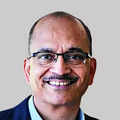
India, with a median age of 28 and over 65% of its population in working age, is younger than the US, Britain, China and Japan. By 2030, India's share of the working-age population will rise to about 69%. However, with falling birthrates and increasing life expectancy, India will start ageing after that. We need to capitalise on this narrow window of opportunity now focusing on certain areas:
Create jobs Over the last decade, India's GDP growth has been productivity-led. While productivity will always be an important driver of growth, the next step up must come from higher job creation. Over the next 10 years, India will need to create 90 mn non-farm jobs to manage the inevitable migration of labour from agriculture, and provide meaningful employment opportunities to the increasing working-age population.
This will need concerted action in sectors with high employment elasticity. India's service and MSME sectors need to play a bigger role. For instance, the share of employment generated by MSMEs in most developed economies is over 60%, while in India, it's about 45%. We must tap this potential.
Employability It should be ensured that our working-age population be employable and contributes to the economy. Top CEOs call out the relative scarcity of a skilled task force as one of the biggest impediments to India's growth. According to Mercer Mettl's India's Graduate Skill Index 2023 report, only 45% of India's graduates are employable. The problem begins at the school level, where students are not learning. Quality of education has to improve.
At the same time, focus on:
- Building a solid foundation in primary education.
- Providing access to vocational skill-building.
- Reskilling and upskilling existing workforce.
- Making India the 'country of choice' for top talent.
Vocational training: While actions are being taken to strengthen primary education further, a significant gap remains regarding school-to-work transition. There is a disparity between enrolling for higher education and vocational training. This could be attributed to a cultural mindset on employment in skilled vocations. For a country to progress, this mindset needs to change. We must understand the role that skilled vocational work can play in lifting the economy.
Upgrade skills: Recognising that the world is changing at an unprecedented pace, focus must be on continuous skill upgradation in the workforce.
Stop talent flow: In 2022, 7.7 lakh Indians left the country for higher education, a six-year high. We must make India attractive for our top talent and retain them within the economy.
India Inc + GoI: A close PPP can change the ecosystem by uplifting skills and capabilities on a scale required for our growth ambition.
While India accelerates its growth journey, it must ensure that no one is left behind. Economic and social progress will be key to this. We must create an India where every child receives the education they deserve, and a chance at making the livelihood they dream of.
(Catch all the Business News, Breaking News, Budget 2024 Events and Latest News Updates on The Economic Times.)
Subscribe to The Economic Times Prime and read the ET ePaper online.
(Catch all the Business News, Breaking News, Budget 2024 Events and Latest News Updates on The Economic Times.)
Subscribe to The Economic Times Prime and read the ET ePaper online.










 Get Unlimited Access to The Economic Times
Get Unlimited Access to The Economic Times
